Rebecca Skloot Quotes & Sayings
Enjoy the top 60 famous quotes, sayings and quotations by Rebecca Skloot.
Famous Quotes By Rebecca Skloot
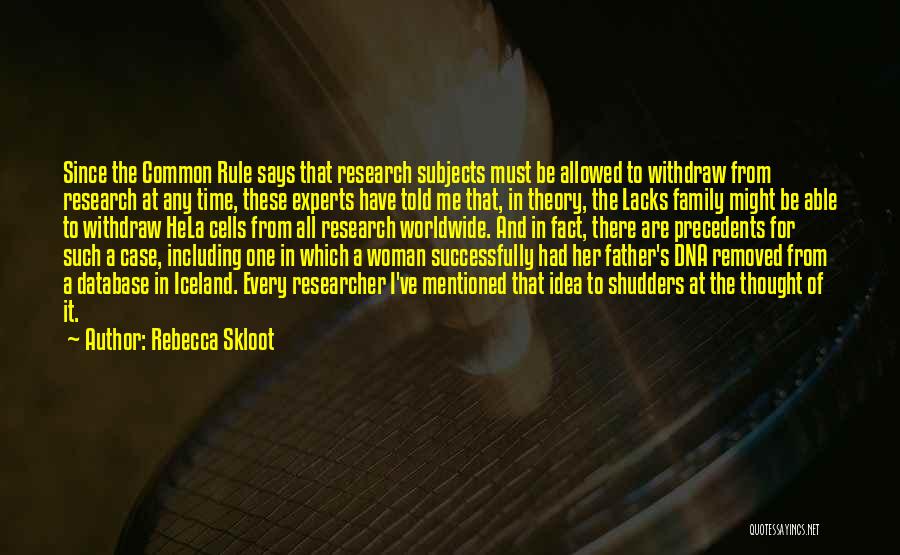
Since the Common Rule says that research subjects must be allowed to withdraw from research at any time, these experts have told me that, in theory, the Lacks family might be able to withdraw HeLa cells from all research worldwide. And in fact, there are precedents for such a case, including one in which a woman successfully had her father's DNA removed from a database in Iceland. Every researcher I've mentioned that idea to shudders at the thought of it. — Rebecca Skloot
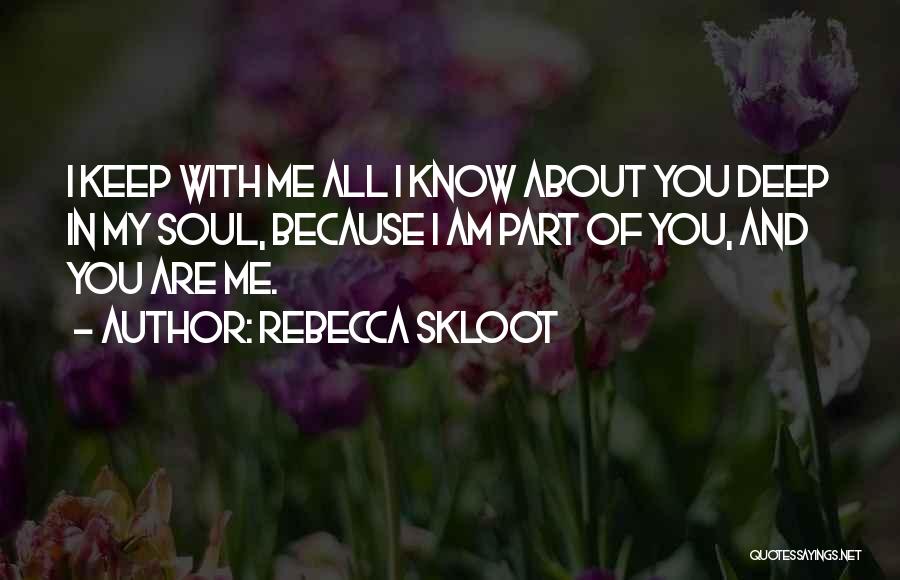
I keep with me all I know about you deep in my soul, because I am part of you, and you are me. — Rebecca Skloot

But today when people talk about the history of Hopkins's relationship with the black community, the story many of them hold up as the worst offense is that of Henrietta Lacks - a black woman whose body, they say, was exploited by white scientists. — Rebecca Skloot
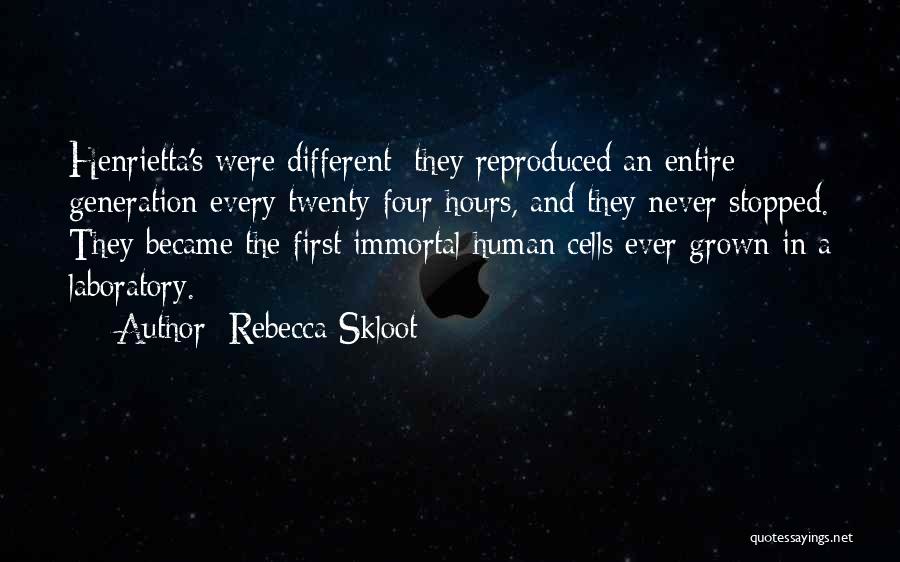
Henrietta's were different: they reproduced an entire generation every twenty-four hours, and they never stopped. They became the first immortal human cells ever grown in a laboratory. — Rebecca Skloot
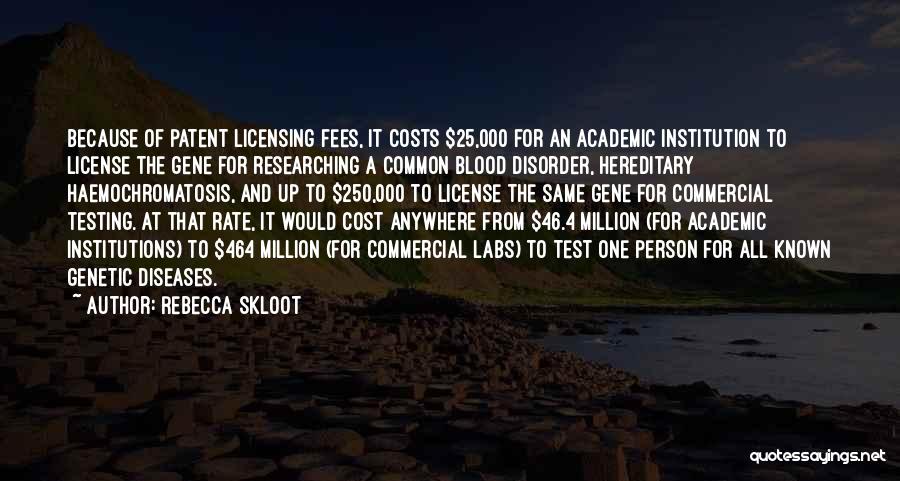
Because of patent licensing fees, it costs $25,000 for an academic institution to license the gene for researching a common blood disorder, hereditary haemochromatosis, and up to $250,000 to license the same gene for commercial testing. At that rate, it would cost anywhere from $46.4 million (for academic institutions) to $464 million (for commercial labs) to test one person for all known genetic diseases. — Rebecca Skloot
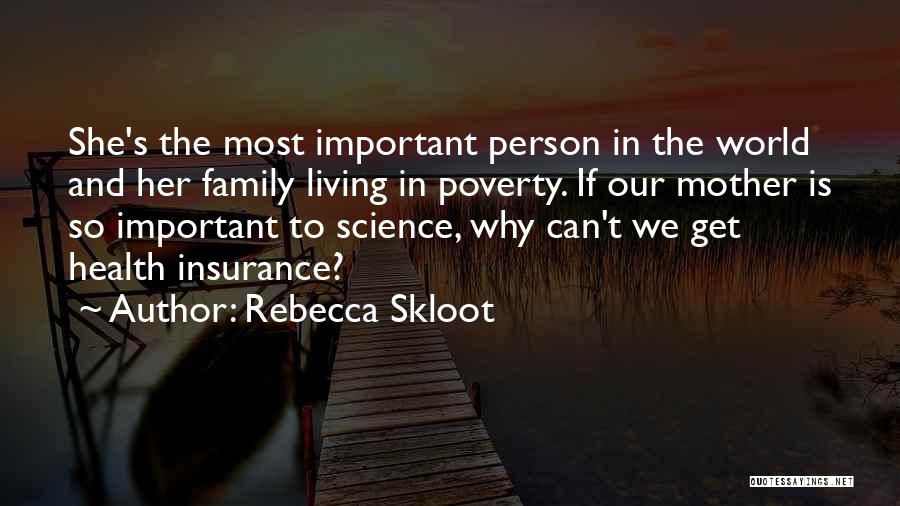
She's the most important person in the world and her family living in poverty. If our mother is so important to science, why can't we get health insurance? — Rebecca Skloot
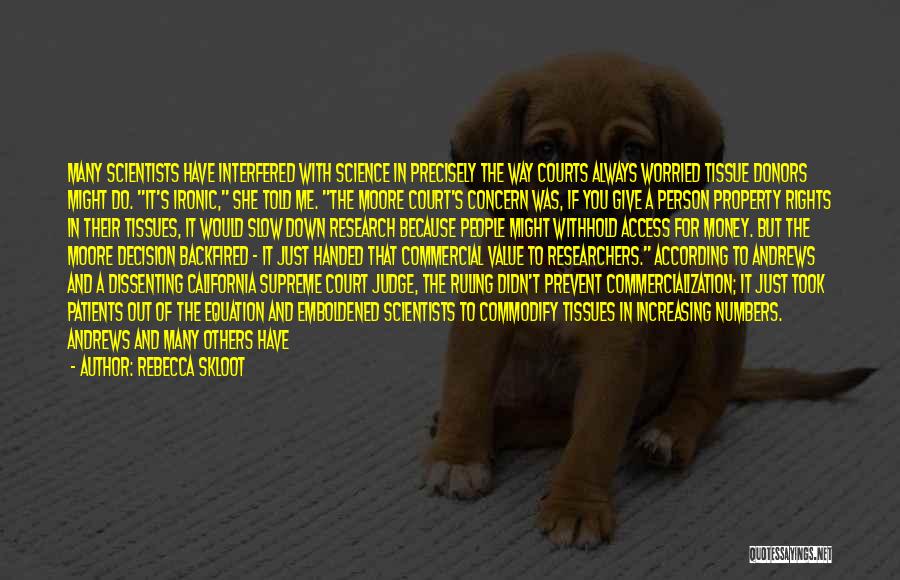
Many scientists have interfered with science in precisely the way courts always worried tissue donors might do. "It's ironic," she told me. "The Moore court's concern was, if you give a person property rights in their tissues, it would slow down research because people might withhold access for money. But the Moore decision backfired - it just handed that commercial value to researchers." According to Andrews and a dissenting California Supreme Court judge, the ruling didn't prevent commercialization; it just took patients out of the equation and emboldened scientists to commodify tissues in increasing numbers. Andrews and many others have argued that this makes scientists less likely to share samples and results, which slows research; they also worry that it interferes with health-care delivery. — Rebecca Skloot
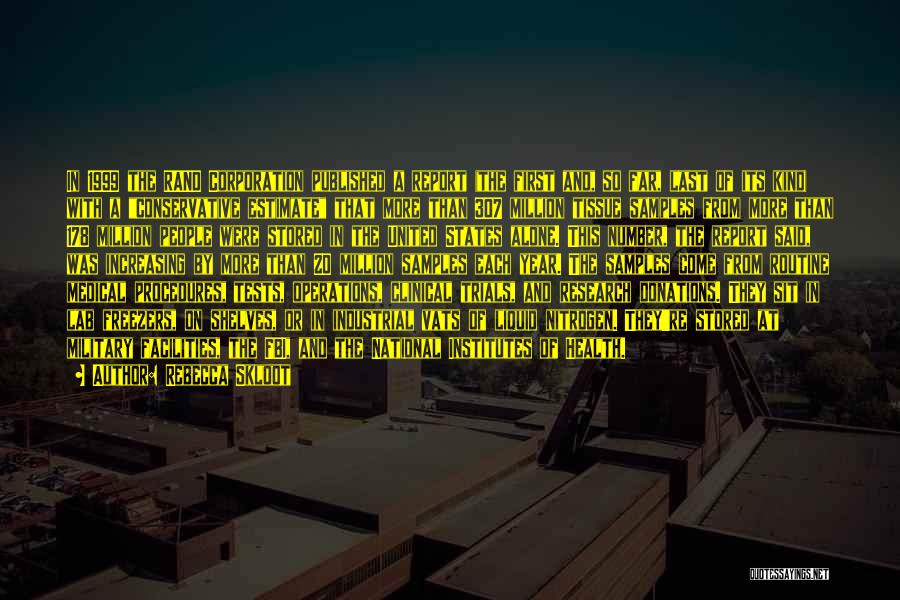
In 1999 the RAND Corporation published a report (the first and, so far, last of its kind) with a "conservative estimate" that more than 307 million tissue samples from more than 178 million people were stored in the United States alone. This number, the report said, was increasing by more than 20 million samples each year. The samples come from routine medical procedures, tests, operations, clinical trials, and research donations. They sit in lab freezers, on shelves, or in industrial vats of liquid nitrogen. They're stored at military facilities, the FBI, and the National Institutes of Health. — Rebecca Skloot
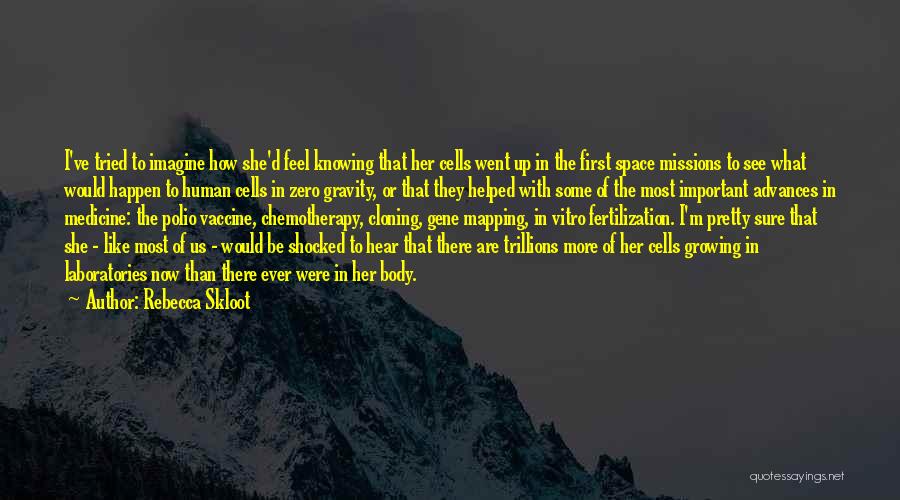
I've tried to imagine how she'd feel knowing that her cells went up in the first space missions to see what would happen to human cells in zero gravity, or that they helped with some of the most important advances in medicine: the polio vaccine, chemotherapy, cloning, gene mapping, in vitro fertilization. I'm pretty sure that she - like most of us - would be shocked to hear that there are trillions more of her cells growing in laboratories now than there ever were in her body. — Rebecca Skloot
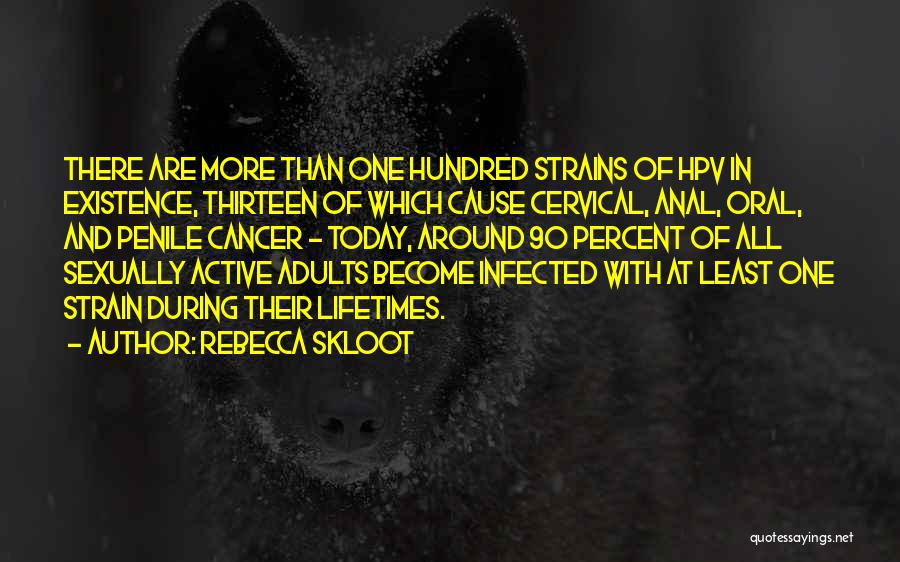
There are more than one hundred strains of HPV in existence, thirteen of which cause cervical, anal, oral, and penile cancer - today, around 90 percent of all sexually active adults become infected with at least one strain during their lifetimes. — Rebecca Skloot
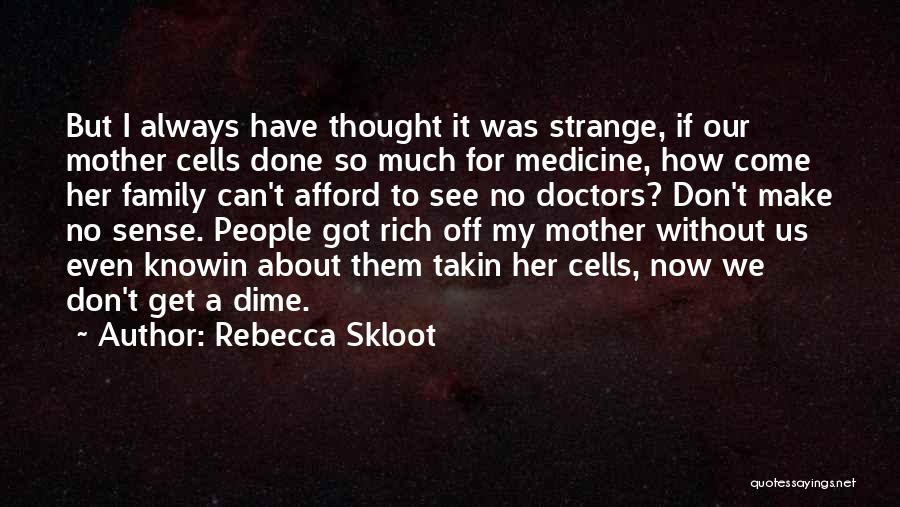
But I always have thought it was strange, if our mother cells done so much for medicine, how come her family can't afford to see no doctors? Don't make no sense. People got rich off my mother without us even knowin about them takin her cells, now we don't get a dime. — Rebecca Skloot

Some things you got to release. Gary said. The more you hold them in, the worse you get. When you release them, they got to go somewhere else. The Bible says He can carry all that burden. — Rebecca Skloot

Often doctors didn't even tell you what was wrong with you. They just treated you, and sent you home. — Rebecca Skloot
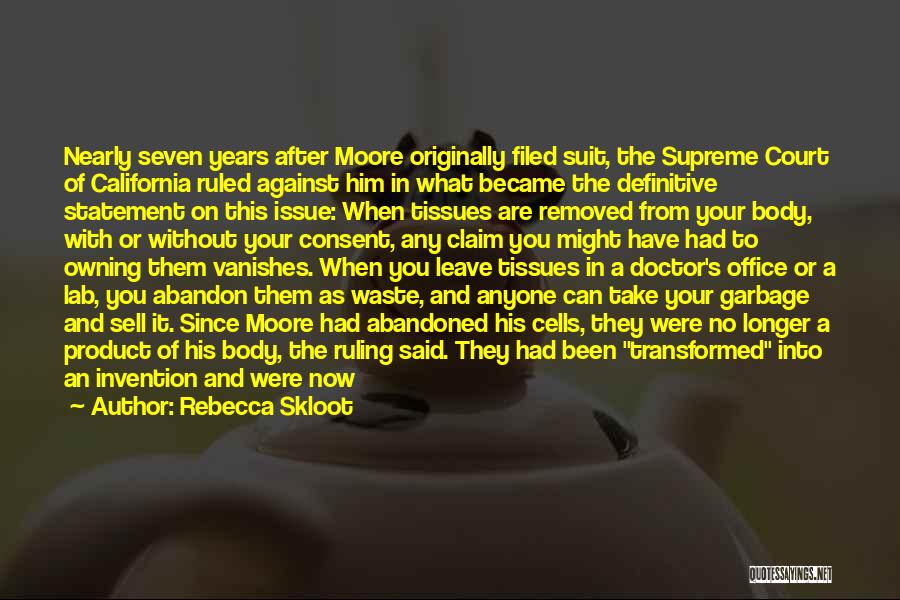
Nearly seven years after Moore originally filed suit, the Supreme Court of California ruled against him in what became the definitive statement on this issue: When tissues are removed from your body, with or without your consent, any claim you might have had to owning them vanishes. When you leave tissues in a doctor's office or a lab, you abandon them as waste, and anyone can take your garbage and sell it. Since Moore had abandoned his cells, they were no longer a product of his body, the ruling said. They had been "transformed" into an invention and were now the product of Golde's "human ingenuity" and "inventive effort. — Rebecca Skloot
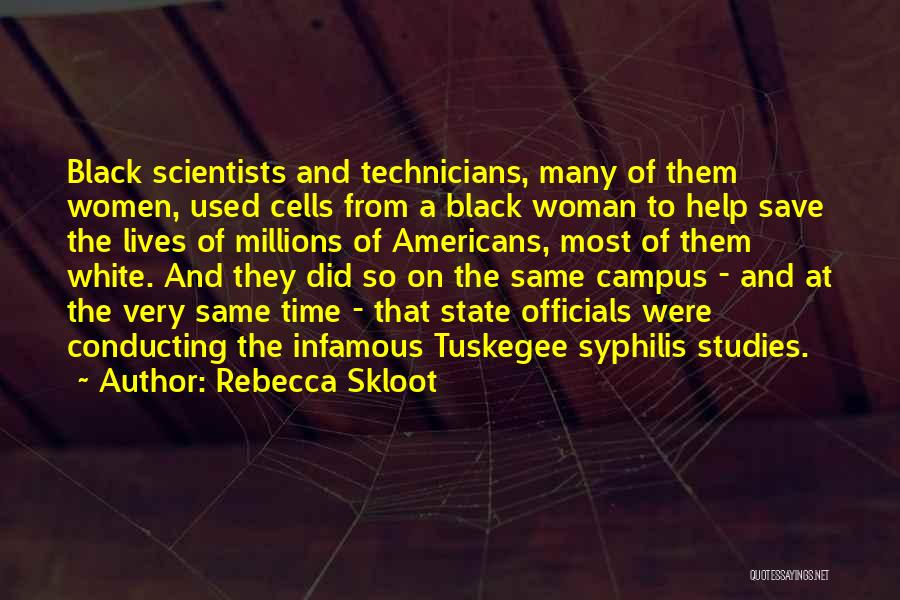
Black scientists and technicians, many of them women, used cells from a black woman to help save the lives of millions of Americans, most of them white. And they did so on the same campus - and at the very same time - that state officials were conducting the infamous Tuskegee syphilis studies. — Rebecca Skloot
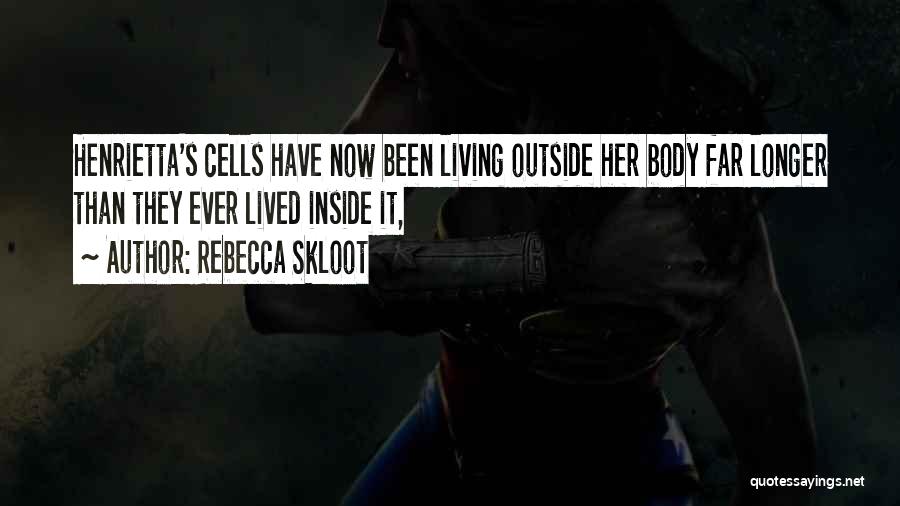
Henrietta's cells have now been living outside her body far longer than they ever lived inside it, — Rebecca Skloot
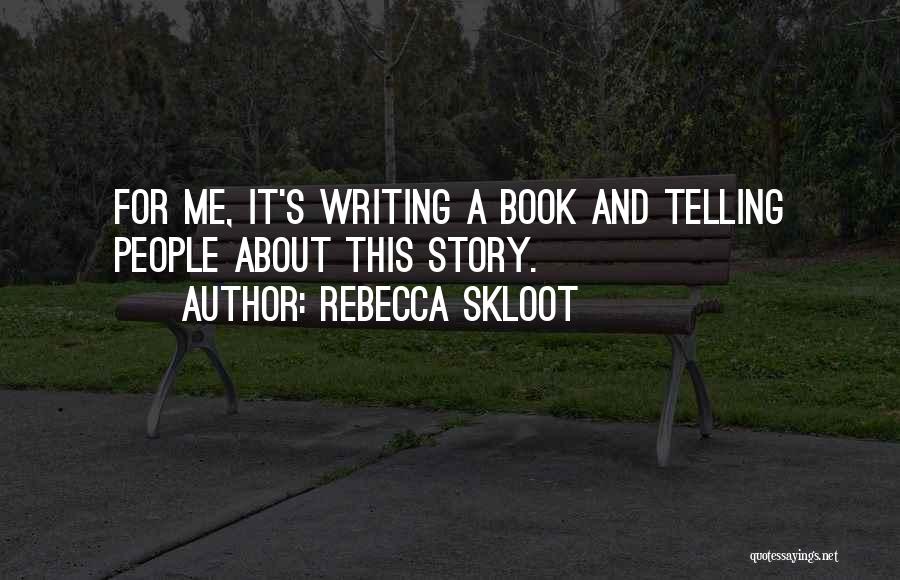
For me, it's writing a book and telling people about this story. — Rebecca Skloot
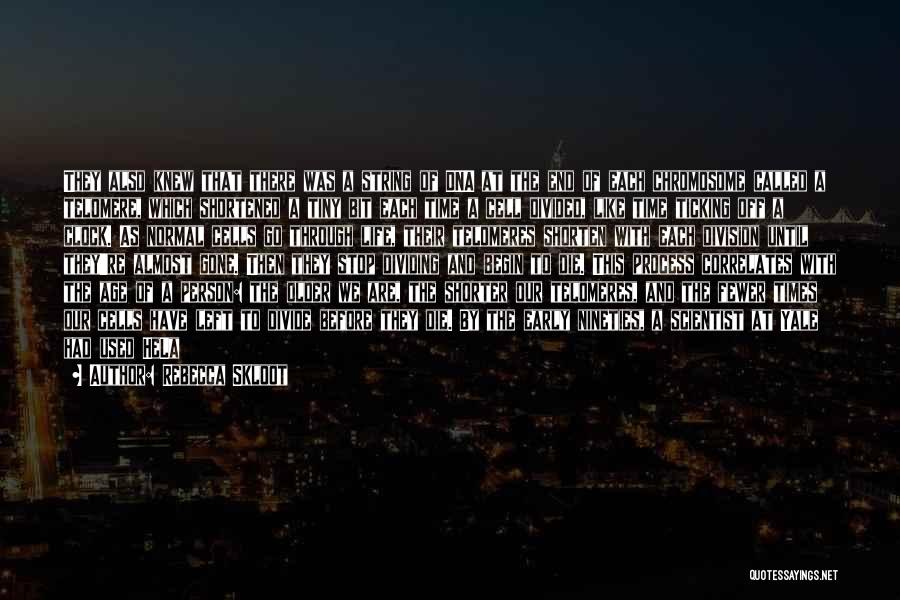
They also knew that there was a string of DNA at the end of each chromosome called a telomere, which shortened a tiny bit each time a cell divided, like time ticking off a clock. As normal cells go through life, their telomeres shorten with each division until they're almost gone. Then they stop dividing and begin to die. This process correlates with the age of a person: the older we are, the shorter our telomeres, and the fewer times our cells have left to divide before they die. By the early nineties, a scientist at Yale had used HeLa to discover that human cancer cells contain an enzyme called telomerase that rebuilds their telomeres. The presence of telomerase meant cells could keep regenerating their telomeres indefinitely. This explained the mechanics of HeLa's immortality: telomerase constantly rewound the ticking clock at the end of Henrietta's chromosomes so they never grew old and never died. — Rebecca Skloot
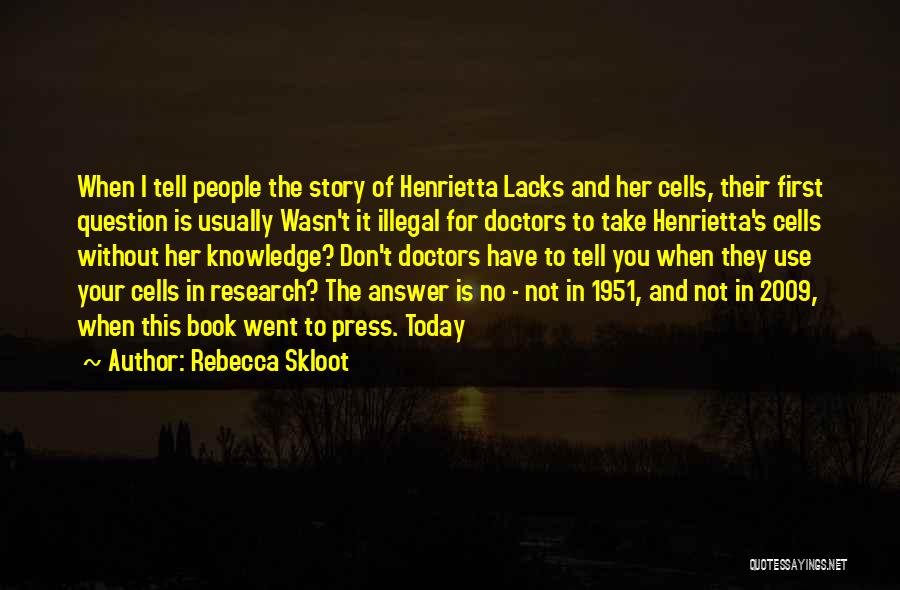
When I tell people the story of Henrietta Lacks and her cells, their first question is usually Wasn't it illegal for doctors to take Henrietta's cells without her knowledge? Don't doctors have to tell you when they use your cells in research? The answer is no - not in 1951, and not in 2009, when this book went to press. Today — Rebecca Skloot
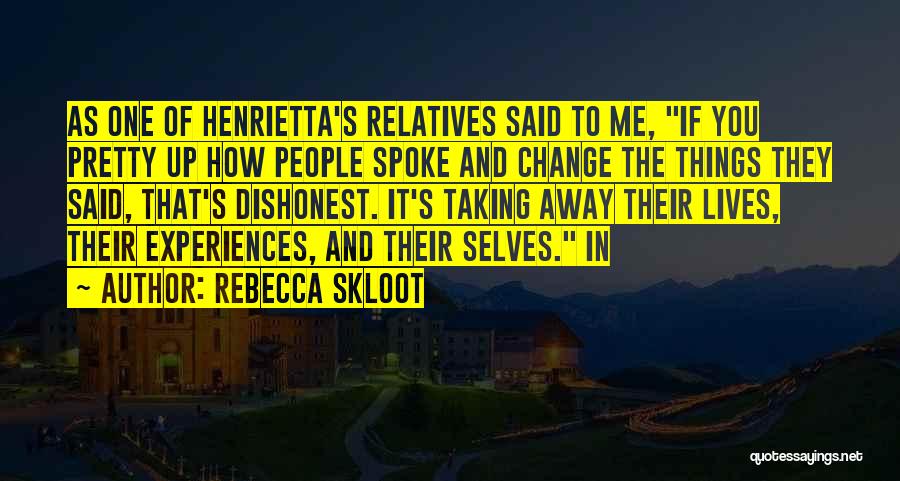
As one of Henrietta's relatives said to me, "If you pretty up how people spoke and change the things they said, that's dishonest. It's taking away their lives, their experiences, and their selves." In — Rebecca Skloot

In immortality for the masses. He was a eugenicist: organ transplantation and life extension were ways to preserve what he saw as the superior white race, which he believed was being polluted by less intelligent and inferior stock, namely the poor, uneducated, and nonwhite. He dreamed of never-ending life for those he deemed worthy, and death or forced sterilization for everyone else. He'd later praise Hitler for the "energetic measures" he took in that direction. — Rebecca Skloot
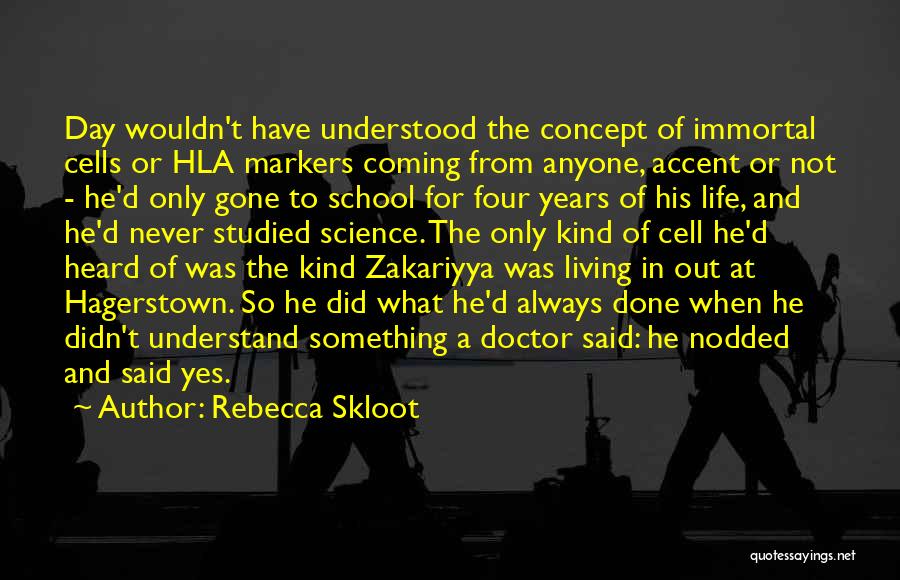
Day wouldn't have understood the concept of immortal cells or HLA markers coming from anyone, accent or not - he'd only gone to school for four years of his life, and he'd never studied science. The only kind of cell he'd heard of was the kind Zakariyya was living in out at Hagerstown. So he did what he'd always done when he didn't understand something a doctor said: he nodded and said yes. — Rebecca Skloot
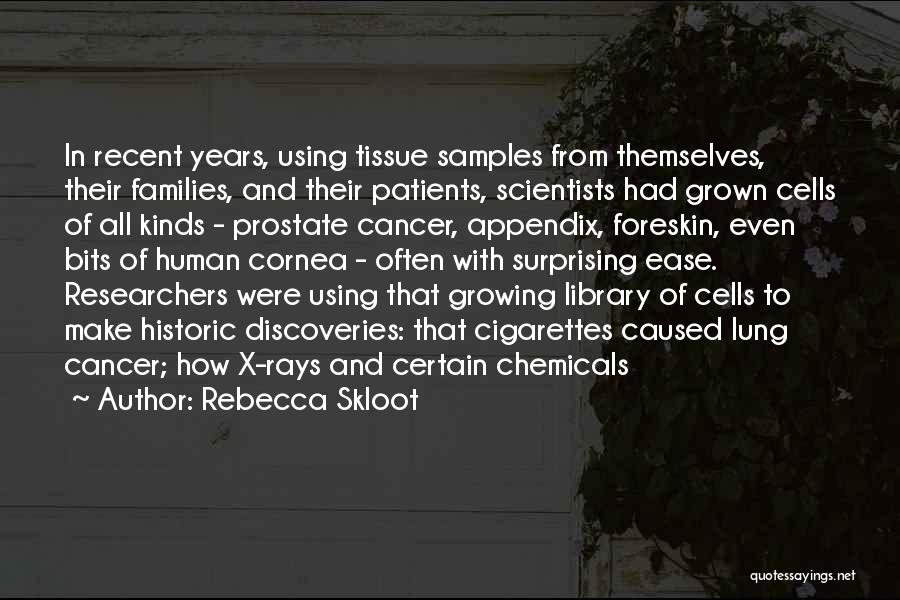
In recent years, using tissue samples from themselves, their families, and their patients, scientists had grown cells of all kinds - prostate cancer, appendix, foreskin, even bits of human cornea - often with surprising ease. Researchers were using that growing library of cells to make historic discoveries: that cigarettes caused lung cancer; how X-rays and certain chemicals — Rebecca Skloot
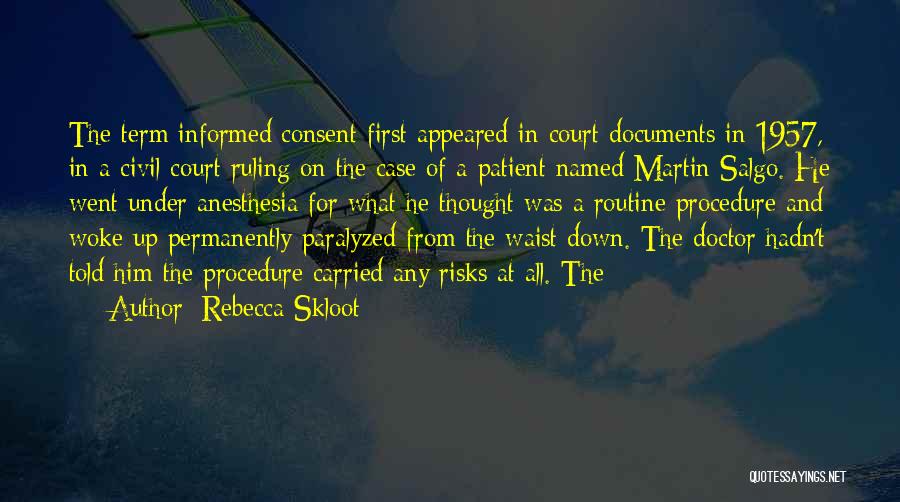
The term informed consent first appeared in court documents in 1957, in a civil court ruling on the case of a patient named Martin Salgo. He went under anesthesia for what he thought was a routine procedure and woke up permanently paralyzed from the waist down. The doctor hadn't told him the procedure carried any risks at all. The — Rebecca Skloot
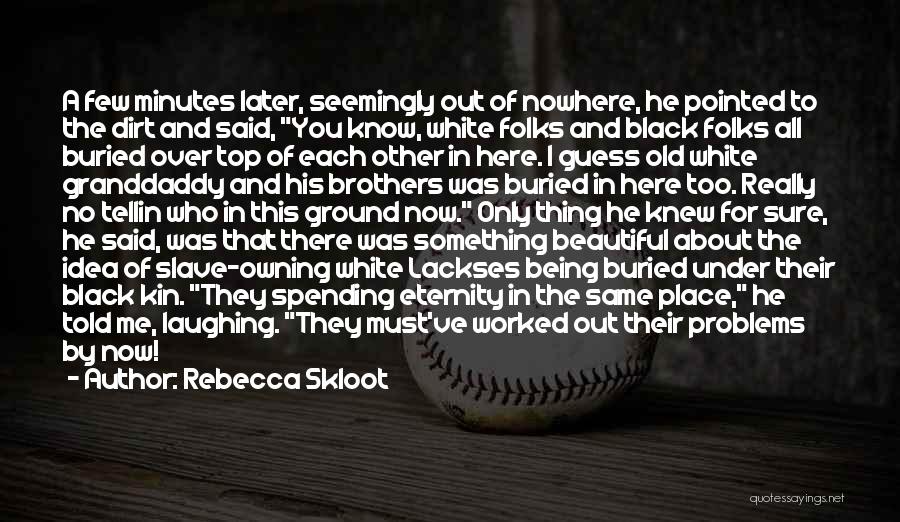
A few minutes later, seemingly out of nowhere, he pointed to the dirt and said, "You know, white folks and black folks all buried over top of each other in here. I guess old white granddaddy and his brothers was buried in here too. Really no tellin who in this ground now." Only thing he knew for sure, he said, was that there was something beautiful about the idea of slave-owning white Lackses being buried under their black kin. "They spending eternity in the same place," he told me, laughing. "They must've worked out their problems by now! — Rebecca Skloot

Like many doctors of his era, TeLinde often used patients from the public wards for research, usually without their knowledge. — Rebecca Skloot
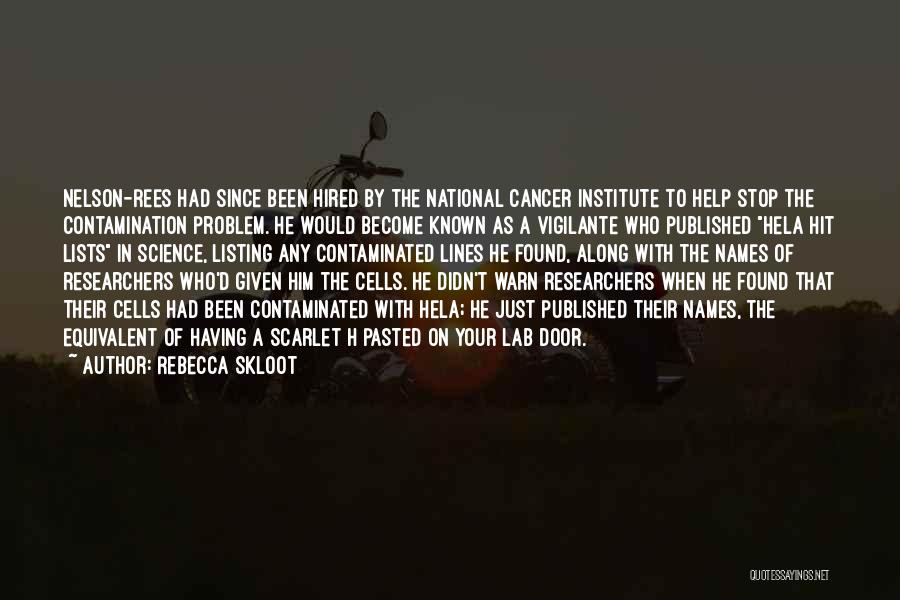
Nelson-Rees had since been hired by the National Cancer Institute to help stop the contamination problem. He would become known as a vigilante who published "HeLa Hit Lists" in Science, listing any contaminated lines he found, along with the names of researchers who'd given him the cells. He didn't warn researchers when he found that their cells had been contaminated with HeLa; he just published their names, the equivalent of having a scarlet H pasted on your lab door. — Rebecca Skloot
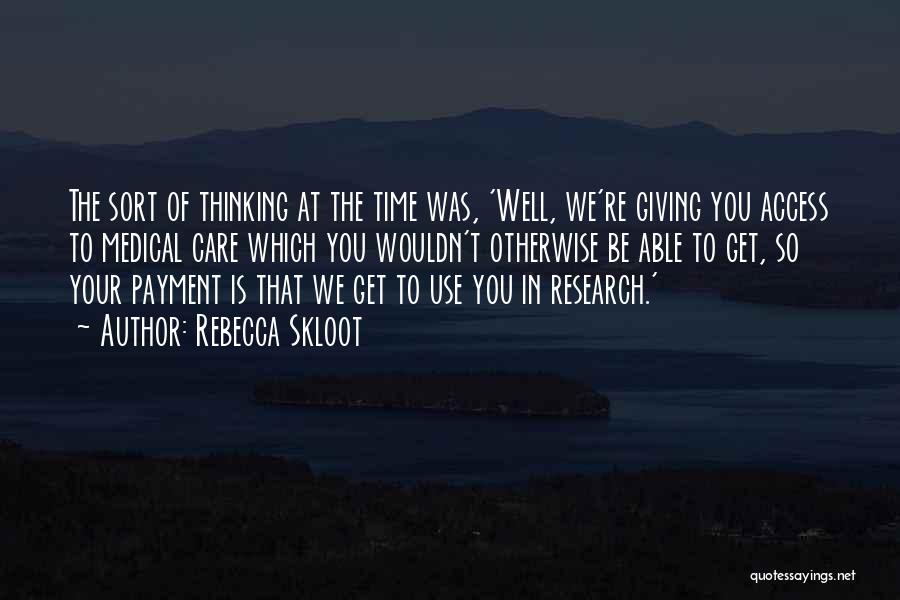
The sort of thinking at the time was, 'Well, we're giving you access to medical care which you wouldn't otherwise be able to get, so your payment is that we get to use you in research.' — Rebecca Skloot
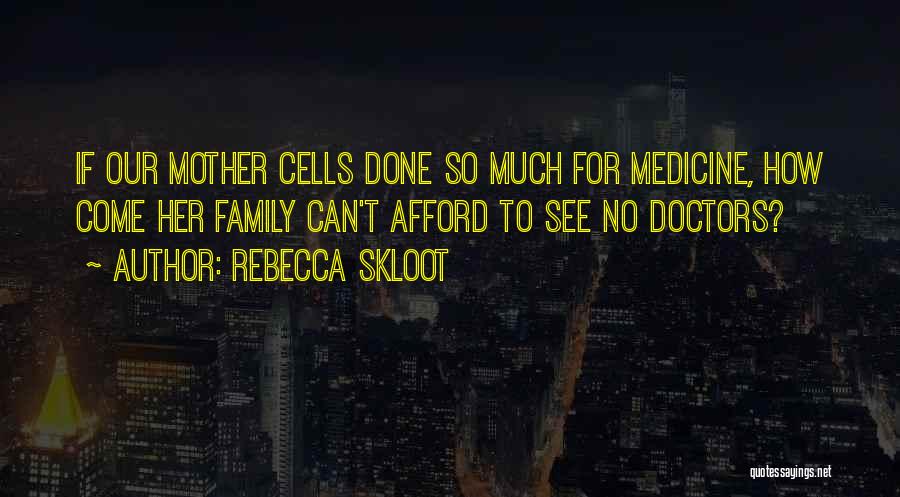
if our mother cells done so much for medicine, how come her family can't afford to see no doctors? — Rebecca Skloot
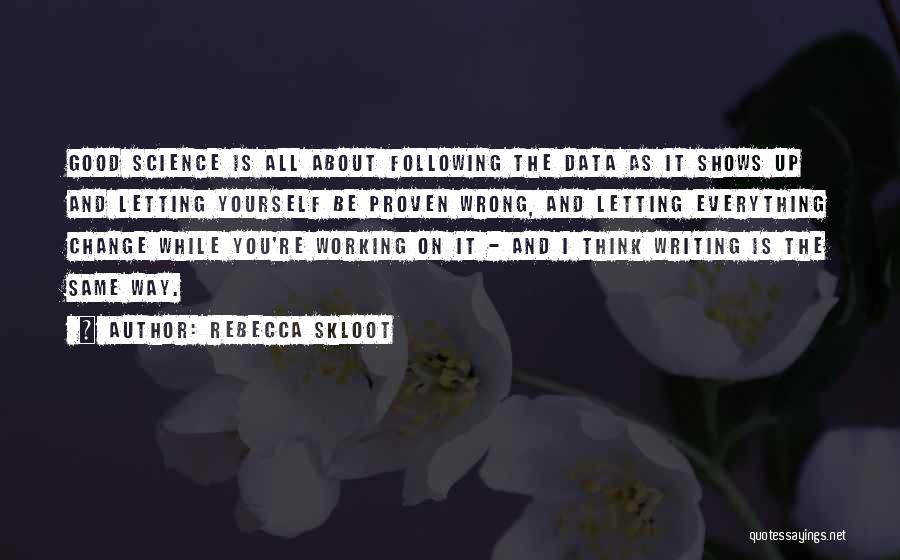
Good science is all about following the data as it shows up and letting yourself be proven wrong, and letting everything change while you're working on it - and I think writing is the same way. — Rebecca Skloot

I learned about HeLa cells in my first basic biology class, and I just became completely obsessed with them from that point on. — Rebecca Skloot

Baltimore, looking at a genetics textbook. Her — Rebecca Skloot
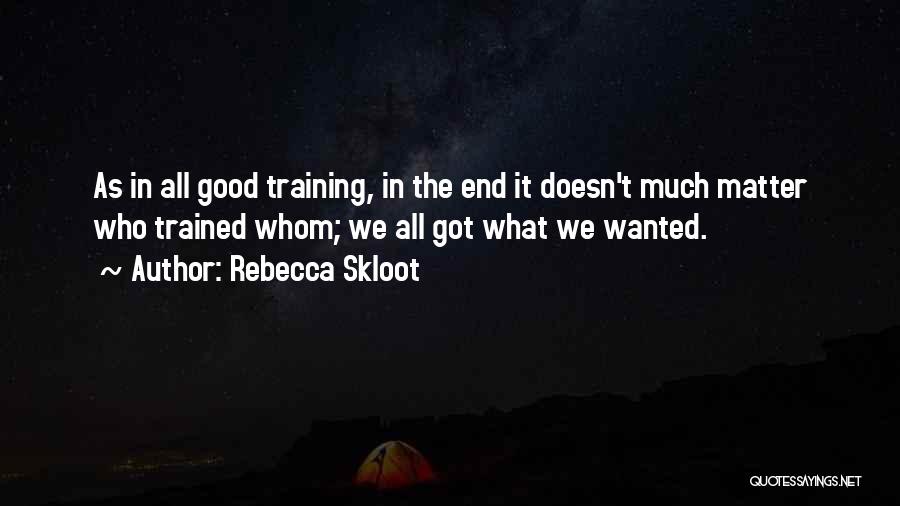
As in all good training, in the end it doesn't much matter who trained whom; we all got what we wanted. — Rebecca Skloot
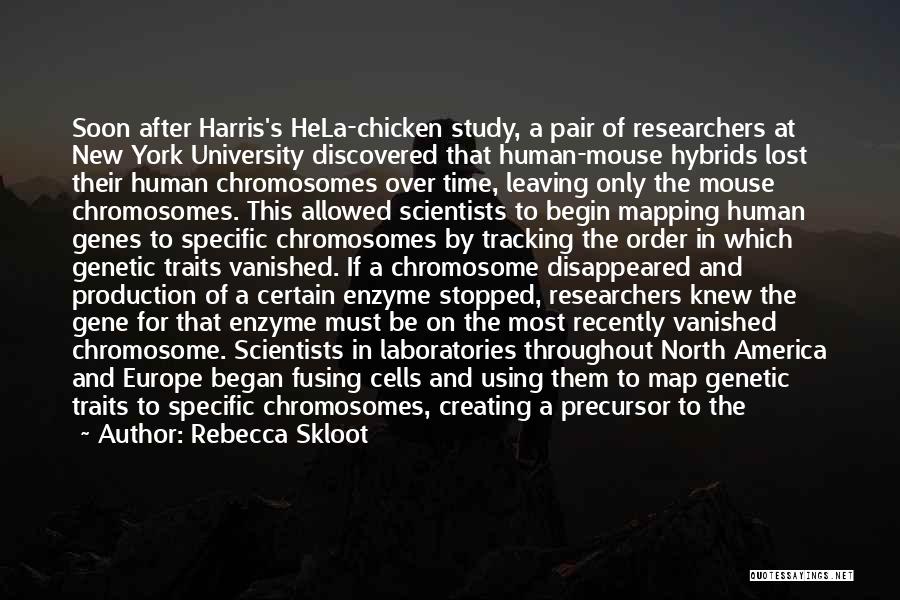
Soon after Harris's HeLa-chicken study, a pair of researchers at New York University discovered that human-mouse hybrids lost their human chromosomes over time, leaving only the mouse chromosomes. This allowed scientists to begin mapping human genes to specific chromosomes by tracking the order in which genetic traits vanished. If a chromosome disappeared and production of a certain enzyme stopped, researchers knew the gene for that enzyme must be on the most recently vanished chromosome. Scientists in laboratories throughout North America and Europe began fusing cells and using them to map genetic traits to specific chromosomes, creating a precursor to the human genome map we have today. — Rebecca Skloot
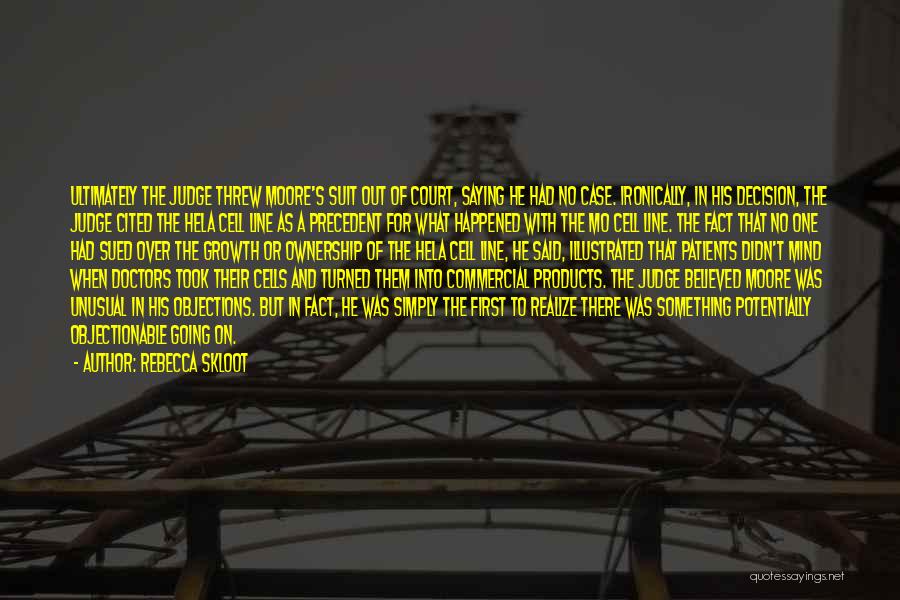
Ultimately the judge threw Moore's suit out of court, saying he had no case. Ironically, in his decision, the judge cited the HeLa cell line as a precedent for what happened with the Mo cell line. The fact that no one had sued over the growth or ownership of the HeLa cell line, he said, illustrated that patients didn't mind when doctors took their cells and turned them into commercial products. The judge believed Moore was unusual in his objections. But in fact, he was simply the first to realize there was something potentially objectionable going on. — Rebecca Skloot
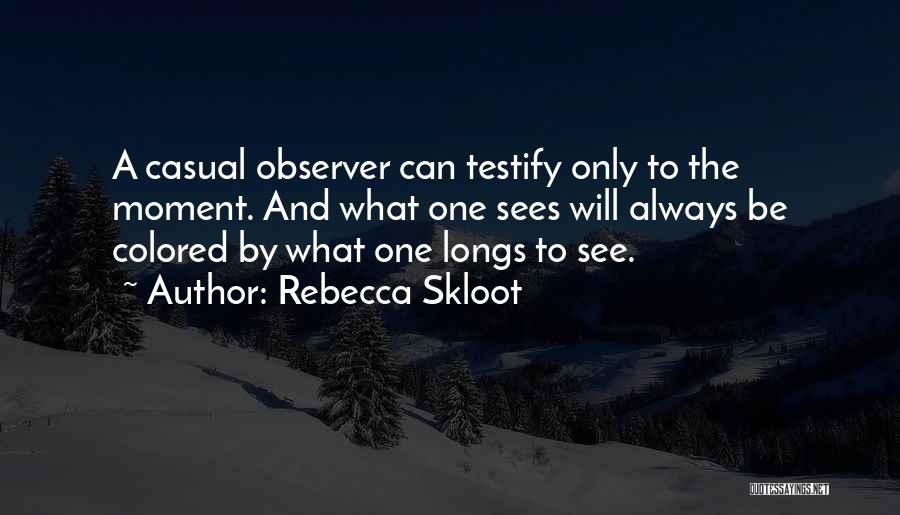
A casual observer can testify only to the moment. And what one sees will always be colored by what one longs to see. — Rebecca Skloot
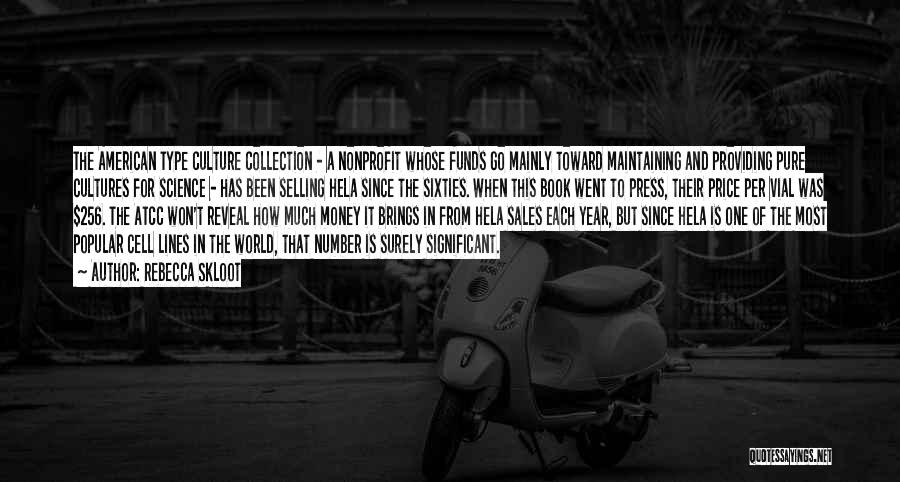
The American Type Culture Collection - a nonprofit whose funds go mainly toward maintaining and providing pure cultures for science - has been selling HeLa since the sixties. When this book went to press, their price per vial was $256. The ATCC won't reveal how much money it brings in from HeLa sales each year, but since HeLa is one of the most popular cell lines in the world, that number is surely significant. — Rebecca Skloot

Like the Bible said,' Gary whispered, 'man brought nothing into this world and he'll carry nothing out. Sometimes we care about stuff too much. We worry when there's nothing to worry about. — Rebecca Skloot

Mary stood beside Wilbur, waiting as he sewed Henrietta's abdomen closed. She wanted to run out of the morgue and back to the lab, but instead, she stared at Henrietta's arms and legs - anything to avoid looking into her lifeless eyes. Then Mary's gaze fell on Henrietta's feet, and she gasped: Henrietta's toenails were covered in chipped bright red polish. "When I saw those toenails," Mary told me years later, "I nearly fainted. I thought, Oh jeez, she's a real person. I started imagining her sitting in her bathroom painting those toenails, and it hit me for the first time that those cells we'd been working with all this time and sending all over the world, they came from a live woman. I'd never thought of it that way." — Rebecca Skloot
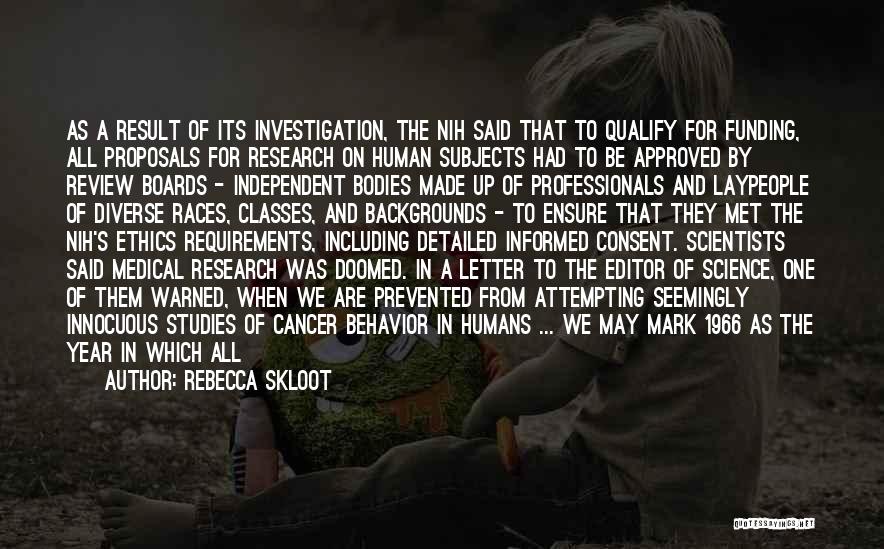
As a result of its investigation, the NIH said that to qualify for funding, all proposals for research on human subjects had to be approved by review boards - independent bodies made up of professionals and laypeople of diverse races, classes, and backgrounds - to ensure that they met the NIH's ethics requirements, including detailed informed consent. Scientists said medical research was doomed. In a letter to the editor of Science, one of them warned, When we are prevented from attempting seemingly innocuous studies of cancer behavior in humans ... we may mark 1966 as the year in which all medical progress ceased. — Rebecca Skloot
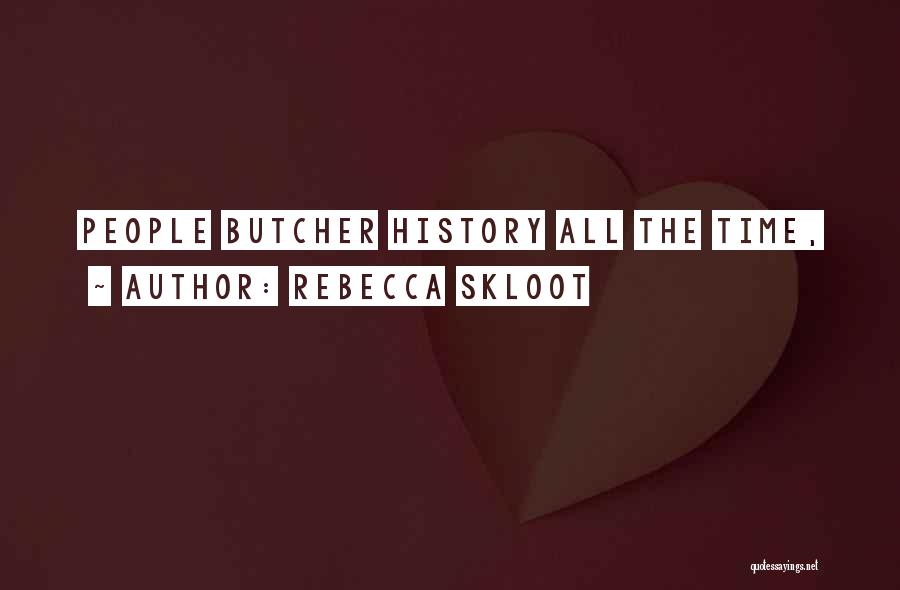
People butcher history all the time, — Rebecca Skloot
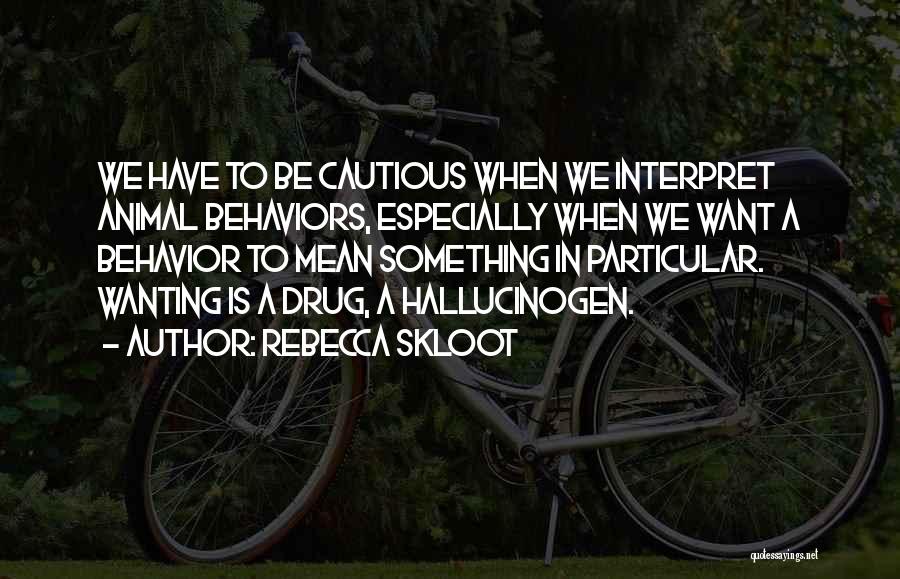
We have to be cautious when we interpret animal behaviors, especially when we want a behavior to mean something in particular. Wanting is a drug, a hallucinogen. — Rebecca Skloot

For an animal that must kill to live, it makes sense for the hunt and the kill to be pleasurable. If you don't kill, you don't eat, and if you don't eat, you die. — Rebecca Skloot
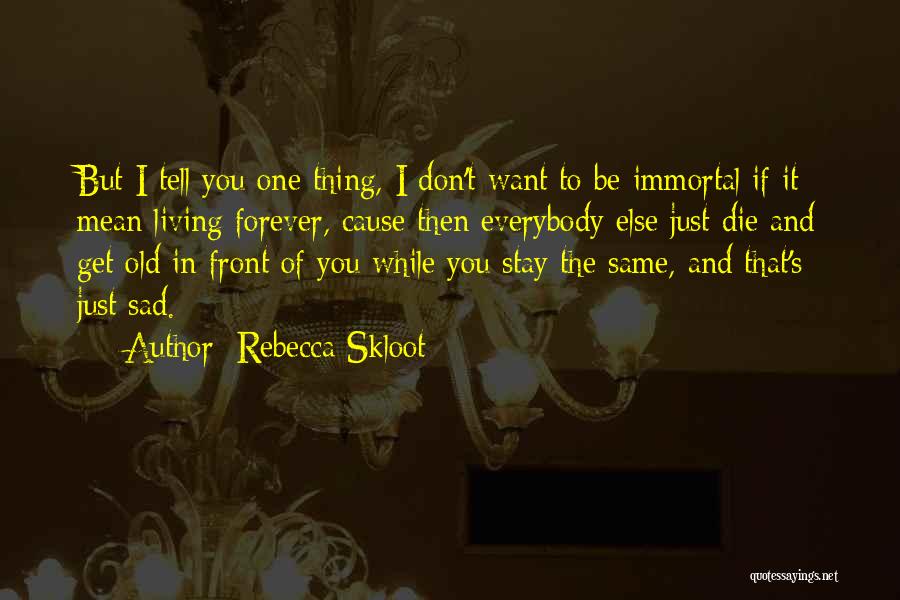
But I tell you one thing, I don't want to be immortal if it mean living forever, cause then everybody else just die and get old in front of you while you stay the same, and that's just sad. — Rebecca Skloot
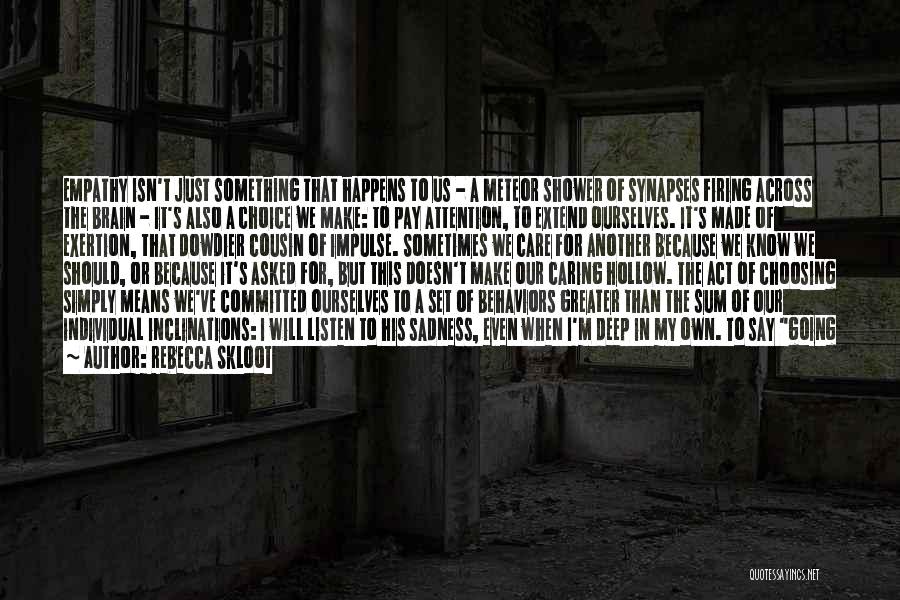
Empathy isn't just something that happens to us - a meteor shower of synapses firing across the brain - it's also a choice we make: to pay attention, to extend ourselves. It's made of exertion, that dowdier cousin of impulse. Sometimes we care for another because we know we should, or because it's asked for, but this doesn't make our caring hollow. The act of choosing simply means we've committed ourselves to a set of behaviors greater than the sum of our individual inclinations: I will listen to his sadness, even when I'm deep in my own. To say "going through the motions" - this isn't reduction so much as acknowledgment of the effort - the labor, the motions, the dance - of getting inside another person's state of heart or mind. — Rebecca Skloot
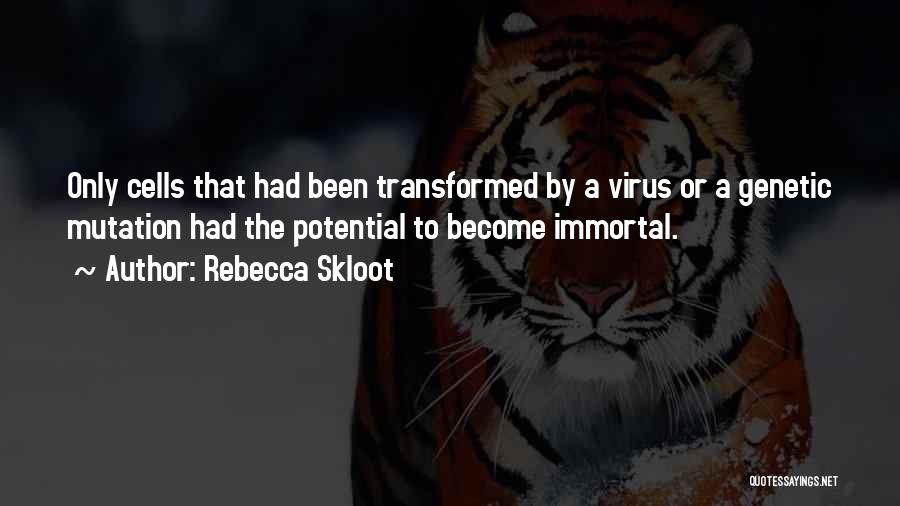
Only cells that had been transformed by a virus or a genetic mutation had the potential to become immortal. — Rebecca Skloot
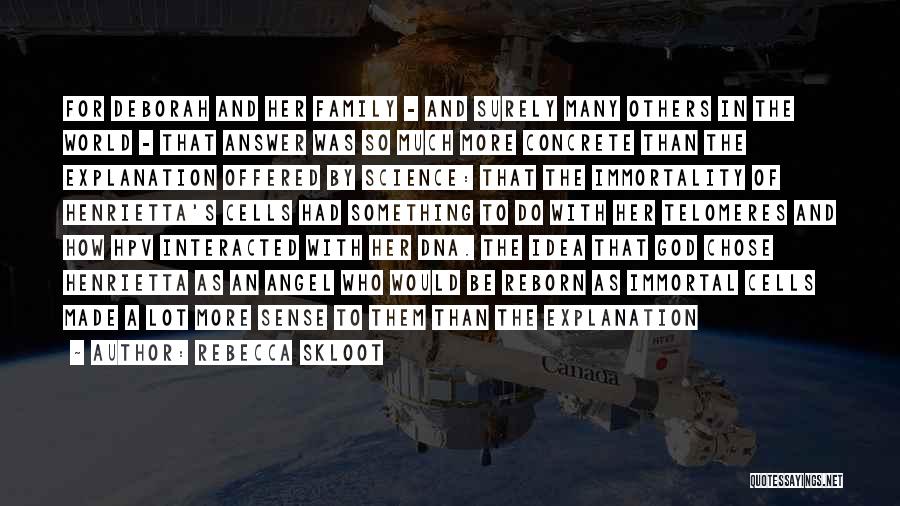
For Deborah and her family - and surely many others in the world - that answer was so much more concrete than the explanation offered by science: that the immortality of Henrietta's cells had something to do with her telomeres and how HPV interacted with her DNA. The idea that God chose Henrietta as an angel who would be reborn as immortal cells made a lot more sense to them than the explanation — Rebecca Skloot
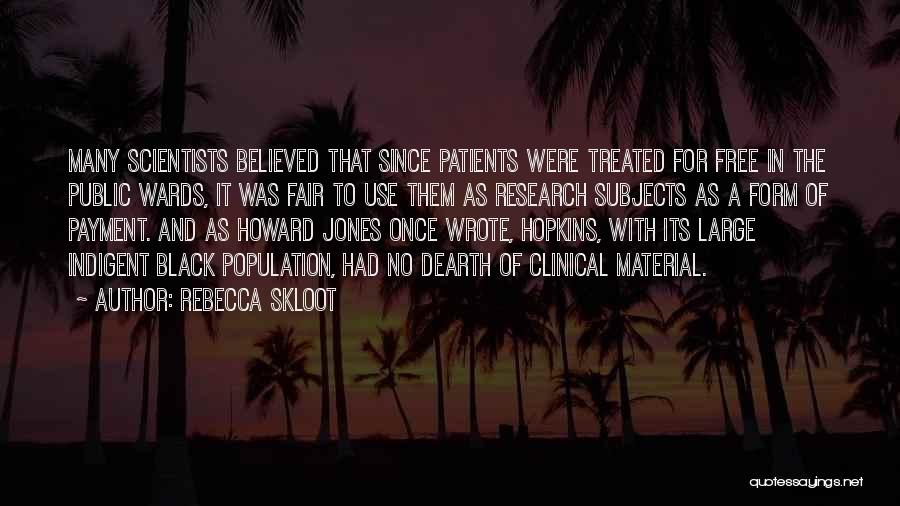
Many scientists believed that since patients were treated for free in the public wards, it was fair to use them as research subjects as a form of payment. And as Howard Jones once wrote, Hopkins, with its large indigent black population, had no dearth of clinical material. — Rebecca Skloot
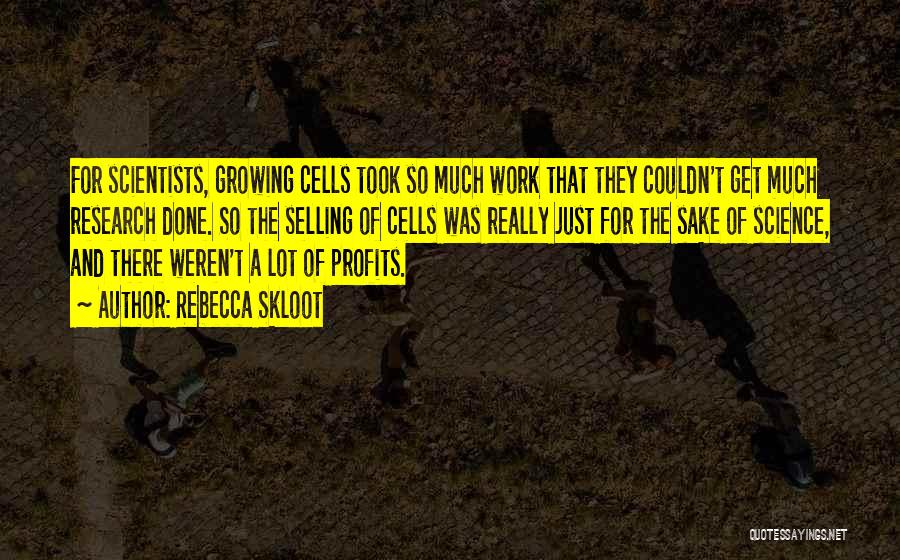
For scientists, growing cells took so much work that they couldn't get much research done. So the selling of cells was really just for the sake of science, and there weren't a lot of profits. — Rebecca Skloot
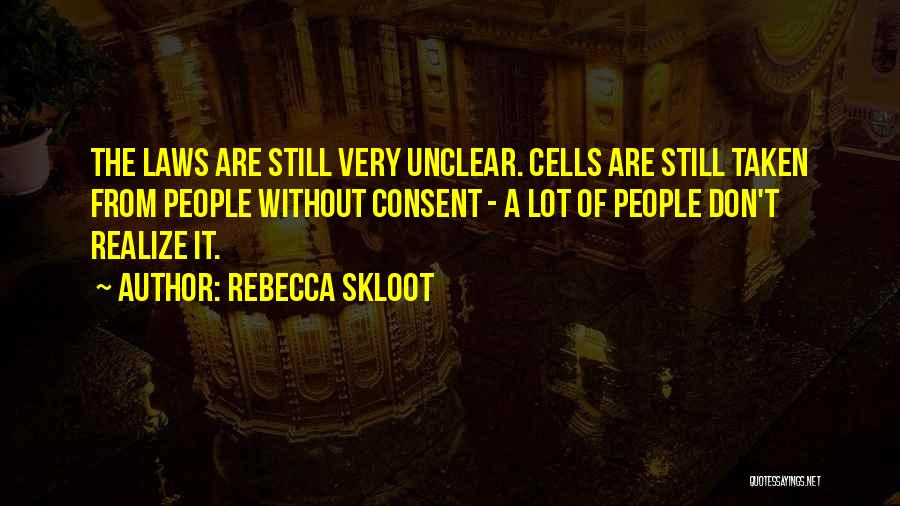
The laws are still very unclear. Cells are still taken from people without consent - a lot of people don't realize it. — Rebecca Skloot
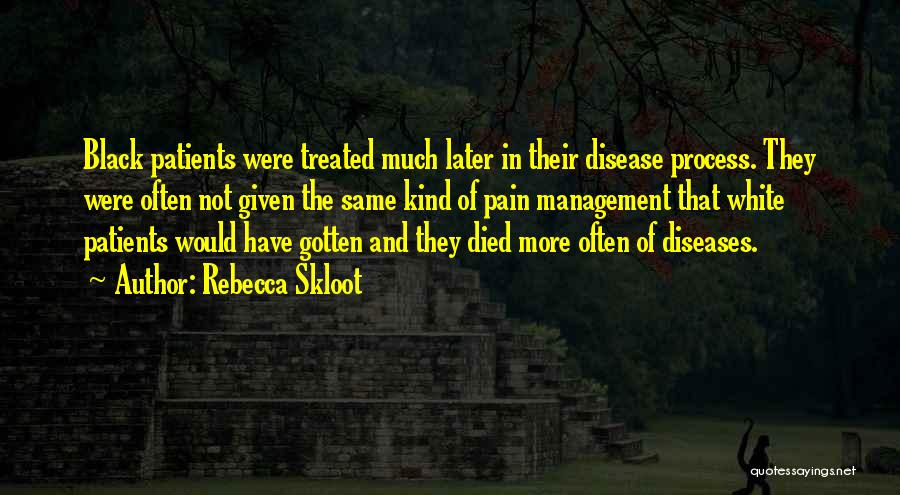
Black patients were treated much later in their disease process. They were often not given the same kind of pain management that white patients would have gotten and they died more often of diseases. — Rebecca Skloot
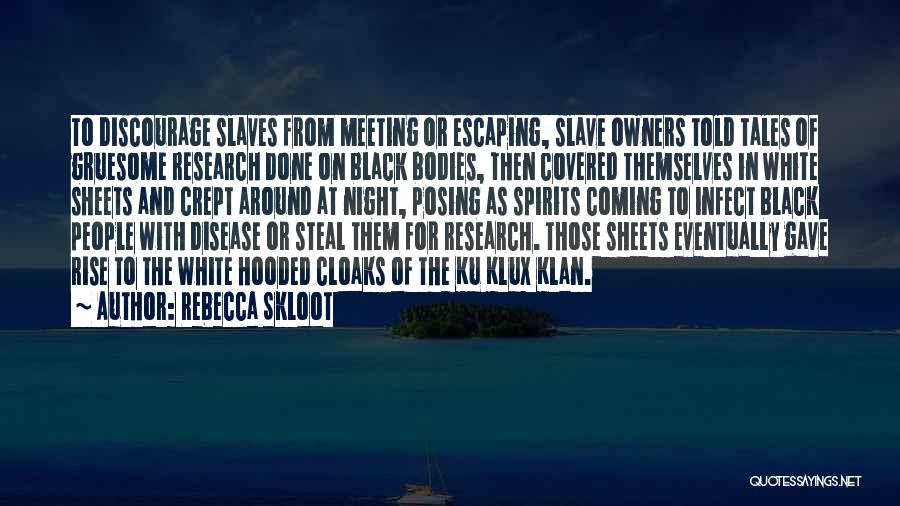
To discourage slaves from meeting or escaping, slave owners told tales of gruesome research done on black bodies, then covered themselves in white sheets and crept around at night, posing as spirits coming to infect black people with disease or steal them for research. Those sheets eventually gave rise to the white hooded cloaks of the Ku Klux Klan. — Rebecca Skloot

When he asked if she was okay, her eyes welled with tears and she said, Like I'm always telling my brothers, if you gonna go into history, you can't do it with a hate attitude. You got to remember, times was different. — Rebecca Skloot
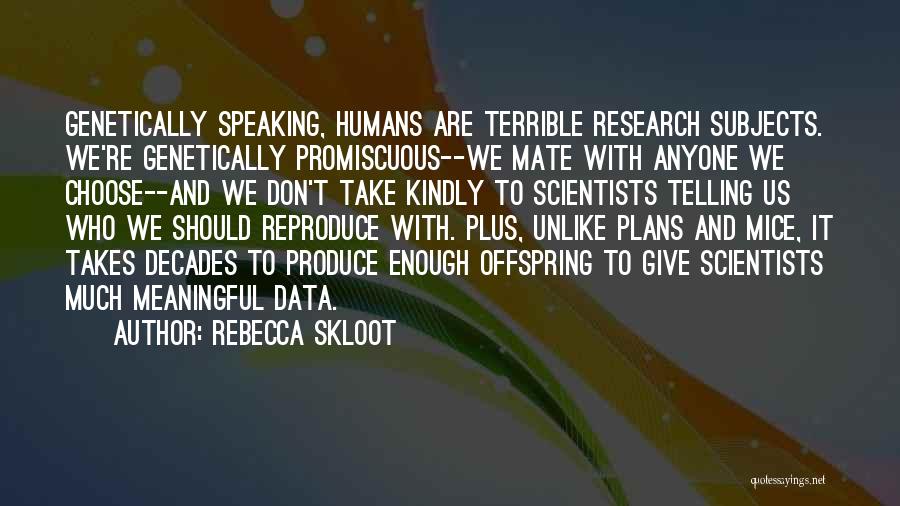
Genetically speaking, humans are terrible research subjects. We're genetically promiscuous--we mate with anyone we choose--and we don't take kindly to scientists telling us who we should reproduce with. Plus, unlike plans and mice, it takes decades to produce enough offspring to give scientists much meaningful data. — Rebecca Skloot
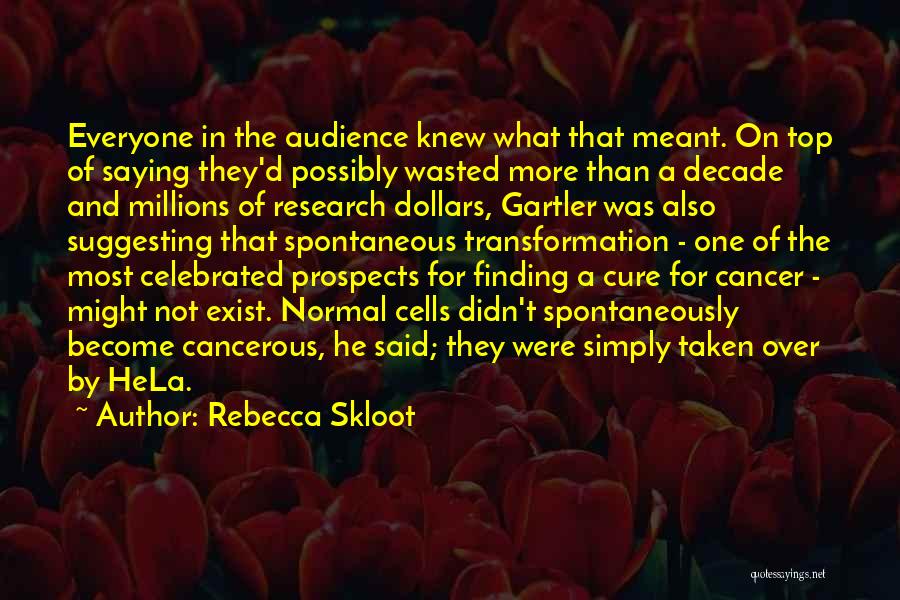
Everyone in the audience knew what that meant. On top of saying they'd possibly wasted more than a decade and millions of research dollars, Gartler was also suggesting that spontaneous transformation - one of the most celebrated prospects for finding a cure for cancer - might not exist. Normal cells didn't spontaneously become cancerous, he said; they were simply taken over by HeLa. — Rebecca Skloot
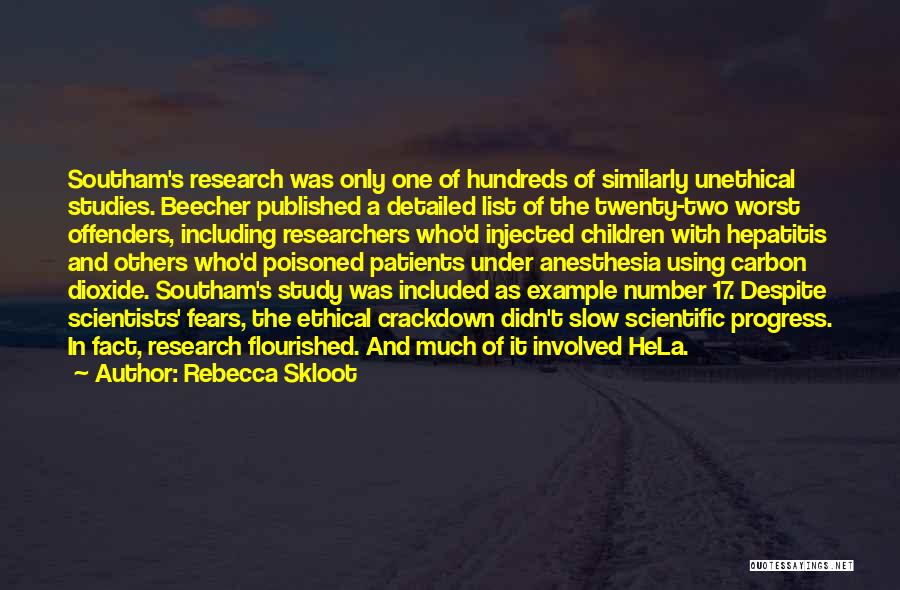
Southam's research was only one of hundreds of similarly unethical studies. Beecher published a detailed list of the twenty-two worst offenders, including researchers who'd injected children with hepatitis and others who'd poisoned patients under anesthesia using carbon dioxide. Southam's study was included as example number 17. Despite scientists' fears, the ethical crackdown didn't slow scientific progress. In fact, research flourished. And much of it involved HeLa. — Rebecca Skloot

And in the late nineties, two women sued Hopkins, claiming that its researchers had knowingly exposed their children to lead, and hadn't promptly informed them when blood tests revealed that their children had elevated lead levels - even when one developed lead poisoning. The research was part of a study examining lead abatement methods, and all families involved were black. The researchers had treated several homes to varying degrees, then encouraged landlords to rent those homes to families with children so they could then monitor the children's lead levels. — Rebecca Skloot
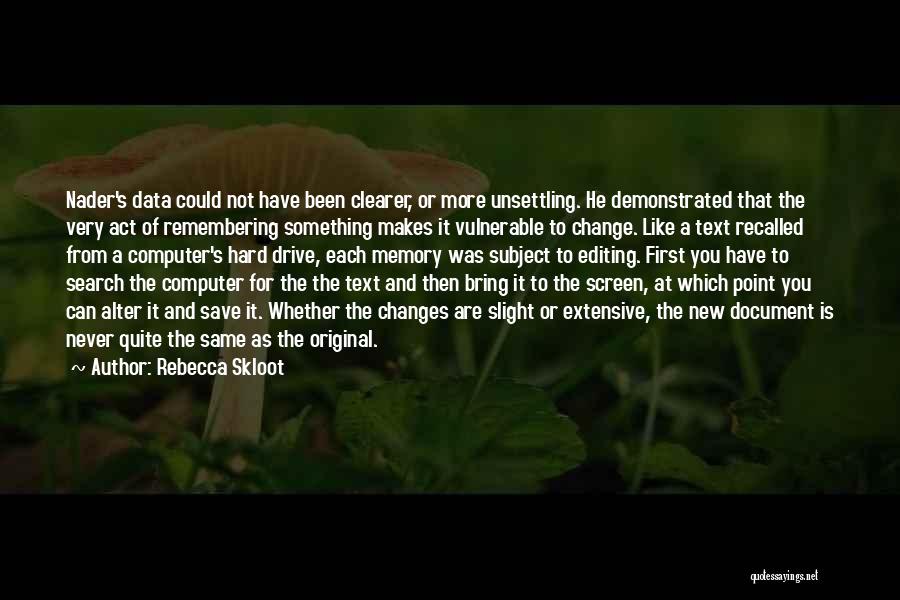
Nader's data could not have been clearer, or more unsettling. He demonstrated that the very act of remembering something makes it vulnerable to change. Like a text recalled from a computer's hard drive, each memory was subject to editing. First you have to search the computer for the the text and then bring it to the screen, at which point you can alter it and save it. Whether the changes are slight or extensive, the new document is never quite the same as the original. — Rebecca Skloot
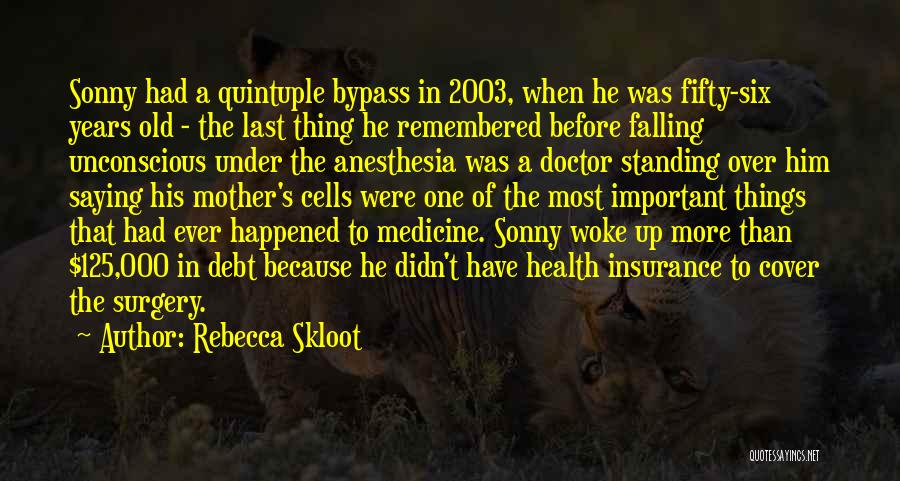
Sonny had a quintuple bypass in 2003, when he was fifty-six years old - the last thing he remembered before falling unconscious under the anesthesia was a doctor standing over him saying his mother's cells were one of the most important things that had ever happened to medicine. Sonny woke up more than $125,000 in debt because he didn't have health insurance to cover the surgery. — Rebecca Skloot






